MercoPress. South Atlantic News Agency
Tag: Nicolas Dujovne
-
Wednesday, July 4th 2018 - 08:13 UTC
Argentina reveals financial needs; stock market and the Peso rebound
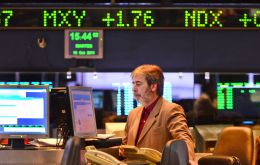
Argentina will need to raise a net US$ 8 billion in the domestic debt market in 2019 to meet financing needs that include a US$ 7.4 billion primary deficit and US$ 25 billion in debt principal and interest payments, according to a Treasury Ministry document.
-
Tuesday, July 3rd 2018 - 07:33 UTC
Argentina hikes bank reserves; Peso gains 1.9% vs the dollar and settles at 28.3

Argentina's central bank said on Monday that it hiked bank reserve requirements by 3 percentage points, following a hike of three percentage points on June 18 as monetary policymakers seek to calm inflation and end a run on the peso currency. The Peso gained 1.9% on Monday against the dollar.
-
Wednesday, June 27th 2018 - 08:12 UTC
Argentine economy shrinks 0.9% as agriculture hit by drought plummets 31%
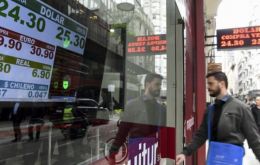
Argentina’s economy shrank in April for the first time in more than a year, government data showed on Tuesday, while the central bank held its policy rate stable at 40% in the first rate decision since a shakeup in its leadership.
-
Friday, June 22nd 2018 - 09:16 UTC
Stocks up 6% and the Peso stabilized following MSCI upgrade of Argentina
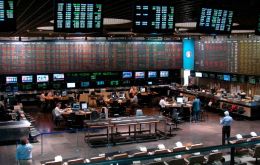
Argentine stocks surged on Thursday after index provider MSCI upgraded the country to its emerging markets index a day earlier, a respite from months of dismal economic news for market-friendly President Mauricio Macri. The local Merval stock index closed up 6%, led by industrials and banks. Investment bank Grupo Financiero Valores led gains, rising 18.3%, while aluminum producer Aluar rose 13%.
-
Friday, June 15th 2018 - 06:56 UTC
Forex run in Argentina: Macri appoints new Central bank president
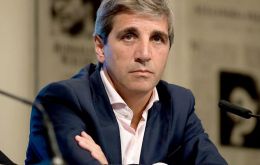
Argentine president Mauricio Macri appointed Finance Minister Luis Caputo as president of the central bank on Thursday, after the outgoing head of the bank resigned and acknowledged having lost credibility.
-
Thursday, June 14th 2018 - 22:14 UTC
IMF's Lagarde welcomes Argentina government’s economic policy plans
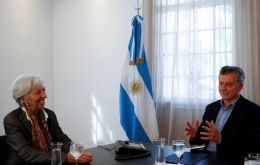
Argentine authorities have asked to use US$7.5 billion of the US$50 billion financing deal signed with the International Monetary Fund to fund their budget, IMF Managing Director Christine Lagarde said in a statement. Argentina’s Finance Ministry said in a separate statement that the funds would be sold on the market through pre-announced daily auctions conducted by the central bank.
-
Thursday, May 31st 2018 - 09:01 UTC
Argentine Senate votes 37 to 30 to freeze utility rates; Macri expected to veto the bill
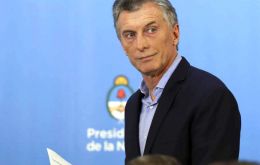
Following twelve hours of heated and at time acrimonious debate the Argentine Senate on early Thursday voted, 37 to 30, to freeze utility prices. President Mauricio Macri had anticipated that if the bill was passed he would veto it because there is no way the budget can stand an additional 1% of GDP deficit.
-
Tuesday, May 15th 2018 - 06:43 UTC
Argentine admits less growth and more inflation, but exports could be boosted with a dearer dollar

High interest rates will have a negative impact on activity, and the weaker peso resulting from a floating exchange rate regime will add to already sky-high inflation, but both are necessary to prevent a deeper crisis, Argentine Treasury Minister Nicolas Dujovne admitted on Monday.
-
Friday, May 11th 2018 - 05:39 UTC
IMF and White House support Macri's economic reform program

International Monetary Fund chief Christine Lagarde said on Thursday she is ready to aid Argentina and wants talks on a financing package to be finalized quickly. Lagarde said she instructed the IMF team to continue discussions on a loan program with the goal to “reach a rapid conclusion.”
-
Thursday, May 10th 2018 - 07:37 UTC
Argentine minister meets IMF Lagarde and US Treasury official: ratifies “gradualism”
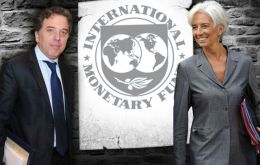
Argentina Economy Minister Nicolas Dujovne is due to meet on Thursday with IMF chief Christine Lagarde to request a financing package to help shore up the struggling economy, officials said. Dujovne will also meet with a senior US Treasury official in a key step in the talks with the IMF, which are likely to last six weeks, his spokesman said in a statement.
